怎么翻译散文
现代散文翻译(汉译英)
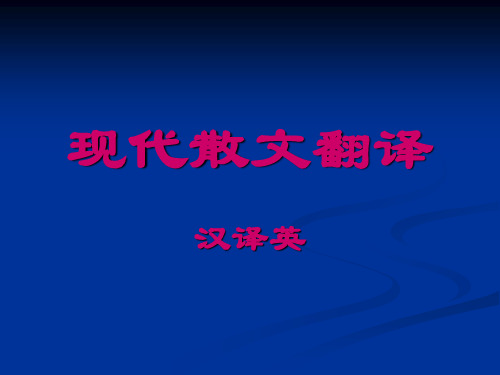
I am on my own. strolling. hands behind my back. This bit of the universe seems in my possession now; and I myself seem to have been uplifted from my ordinary self into another world, I like a serene and peaceful life, as much as a busy and active one; I like being in solitude, as much as in company. As it is tonight, basking in a misty moonshine all by myself. I feel I am a free man, free to think of anything, or of nothing. All that one is obliged to do. or to say, in the daytime, can be very well cast a side now. That is the beauty of being alone. For the moment, just let me indulge in this profusion of moonlight and lotus frafragrance.
现代散文翻译
汉译英
荷塘月色
朱自清
荷塘月色
这几天心里颇不宁静。今晚在院子里坐着 这几天心里颇不宁静。 乘凉,忽然想起日日走过的荷塘, 乘凉,忽然想起日日走过的荷塘,在这满 月的光里,总该另有一番样子吧。 月的光里,总该另有一番样子吧。月亮渐 渐地升高了,墙外马路上孩子们的欢笑, 渐地升高了,墙外马路上孩子们的欢笑, 已经听不见了;妻在屋里拍着闰儿, 已经听不见了;妻在屋里拍着闰儿,迷迷 糊糊地哼着眠歌。我悄悄地披了大衫, 糊糊地哼着眠歌。我悄悄地披了大衫,带 上门出去。 上门出去。
优美散文翻译(中英对照)

想你的时候有些幸福,幸福得有些难过。
Be happywhen I miss you, but wit h sorrow.经不住似水流年,逃不过此间少年。
Cannot standup to the yearsrollin g l ike a stream,and cannot escape the youth.原来地久天长,只是误会一场。
Origin allyperman ent, only misund ersta nding和爱的人吵架,和陌生人讲心里话。
Quarre lingwith lover, sharin g innerm ost feelin gs with strang er.听悲伤的歌,看幸福的戏。
Listen ing to depres sed songs,watchi nging joy fushows .人生若只如初见。
If the life is only like initia lly seeing.你不过是仗着我喜欢你。
You only counton that I am keen on you.向来缘浅,奈何情深。
With shortpredes tinat ed relati onshi p, but foreve r affect ion.彼年豆蔻,谁许谁地老天荒。
When at youngage, who had premit ted to be perman ent我不在乎你对我的不在乎。
I don't care of your neglec t of me.我相信这个世界永远那么美。
I ever believ e the worldis glorio us and sp lend id.习惯难受,习惯思念,习惯等你,可是却一直没有习惯看不到你。
《唐宋八大家散文鉴赏》翻译
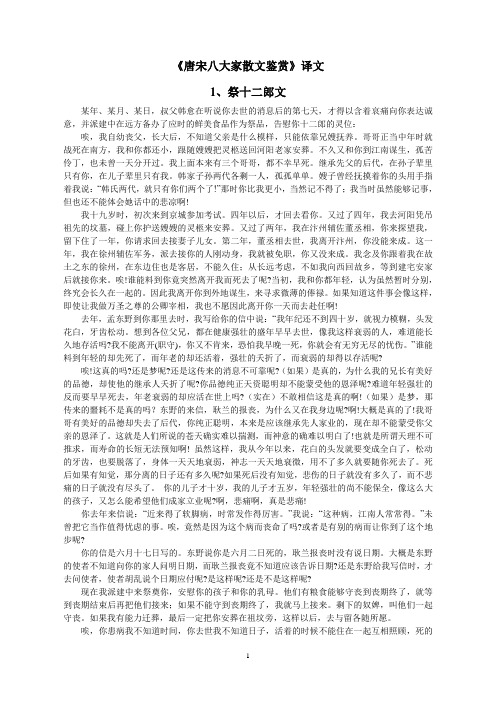
《唐宋八大家散文鉴赏》译文1、祭十二郎文某年、某月、某日,叔父韩愈在听说你去世的消息后的第七天,才得以含着哀痛向你表达诚意,并派建中在远方备办了应时的鲜美食品作为祭品,告慰你十二郎的灵位:唉,我自幼丧父,长大后,不知道父亲是什么模样,只能依靠兄嫂抚养。
哥哥正当中年时就战死在南方,我和你都还小,跟随嫂嫂把灵柩送回河阳老家安葬。
不久又和你到江南谋生,孤苦伶丁,也未曾一天分开过。
我上面本来有三个哥哥,都不幸早死。
继承先父的后代,在孙子辈里只有你,在儿子辈里只有我。
韩家子孙两代各剩一人,孤孤单单。
嫂子曾经抚摸着你的头用手指着我说:“韩氏两代,就只有你们两个了!”那时你比我更小,当然记不得了;我当时虽然能够记事,但也还不能体会她话中的悲凉啊!我十九岁时,初次来到京城参加考试。
四年以后,才回去看你。
又过了四年,我去河阳凭吊祖先的坟墓,碰上你护送嫂嫂的灵柩来安葬。
又过了两年,我在汴州辅佐董丞相,你来探望我,留下住了一年,你请求回去接妻子儿女。
第二年,董丞相去世,我离开汴州,你没能来成。
这一年,我在徐州辅佐军务,派去接你的人刚动身,我就被免职,你又没来成。
我念及你跟着我在故土之东的徐州,在东边住也是客居,不能久住;从长远考虑,不如我向西回故乡,等到建宅安家后就接你来。
唉!谁能料到你竟突然离开我而死去了呢?当初,我和你都年轻,认为虽然暂时分别,终究会长久在一起的。
因此我离开你到外地谋生,来寻求微薄的俸禄。
如果知道这件事会像这样,即使让我做万圣之尊的公卿宰相,我也不愿因此离开你一天而去赴任啊!去年,孟东野到你那里去时,我写给你的信中说:“我年纪还不到四十岁,就视力模糊,头发花白,牙齿松动。
想到各位父兄,都在健康强壮的盛年早早去世,像我这样衰弱的人,难道能长久地存活吗?我不能离开(职守),你又不肯来,恐怕我早晚一死,你就会有无穷无尽的忧伤。
”谁能料到年轻的却先死了,而年老的却还活着,强壮的夭折了,而衰弱的却得以存活呢?唉!这真的吗?还是梦呢?还是这传来的消息不可靠呢?(如果)是真的,为什么我的兄长有美好的品德,却使他的继承人夭折了呢?你品德纯正天资聪明却不能蒙受他的恩泽呢?难道年轻强壮的反而要早早死去,年老衰弱的却应活在世上吗?(实在)不敢相信这是真的啊!(如果)是梦,那传来的噩耗不是真的吗?东野的来信,耿兰的报丧,为什么又在我身边呢?啊!大概是真的了!我哥哥有美好的品德却失去了后代,你纯正聪明,本来是应该继承先人家业的,现在却不能蒙受你父亲的恩泽了。
经典散文《Youth》的翻译作品

英语知识请大家跟我共同欣赏这篇优美的散文翻译作品:Youth is not a time of life; it is a state of mind; it is not a matter of rosy cheeks, red lips and supple knees; it is a matter of the will, a quality of the imagination, a vigor of the emotions; it is the freshness of the deep springs of life.青春不是年华,而是心境;青春不是桃面、丹唇、柔膝,而是深沉的意志,恢宏的想象,炙热的感情;青春是生命的深泉在涌流。
Youth means a temperamental predominance of courage over timidity, of the appetite for adventure over the love of ease. This often exists in a man of 60 more than a boy of 20. Nobody grows old merely by a number of years. We grow old by deserting our ideals.青春气贯长虹,勇锐盖过怯弱,进取压倒苟安。
如此锐气,二十后生而有之,六旬男子则更多见。
年岁有加,并非垂老,理想丢弃,方堕暮年。
Years may wrinkle the skin, but to give up enthusiasm wrinkles the soul. Worry, fear, self-distrust bows the heart and turns the spring back to dust.岁月悠悠,衰微只及肌肤;热忱抛却,颓废必致灵魂。
散文翻译教案模板
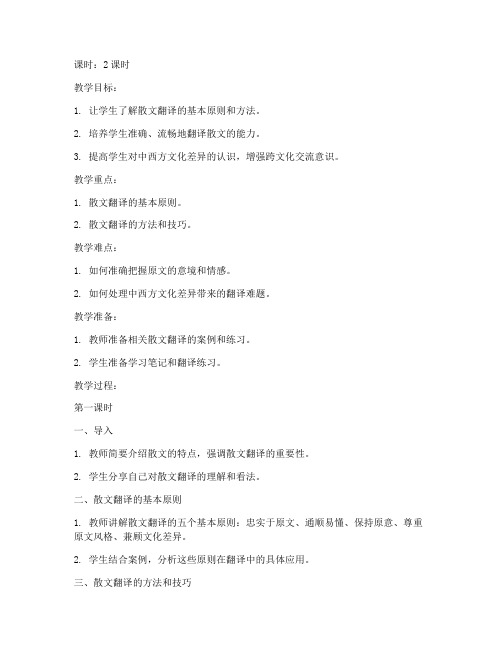
课时:2课时教学目标:1. 让学生了解散文翻译的基本原则和方法。
2. 培养学生准确、流畅地翻译散文的能力。
3. 提高学生对中西方文化差异的认识,增强跨文化交流意识。
教学重点:1. 散文翻译的基本原则。
2. 散文翻译的方法和技巧。
教学难点:1. 如何准确把握原文的意境和情感。
2. 如何处理中西方文化差异带来的翻译难题。
教学准备:1. 教师准备相关散文翻译的案例和练习。
2. 学生准备学习笔记和翻译练习。
教学过程:第一课时一、导入1. 教师简要介绍散文的特点,强调散文翻译的重要性。
2. 学生分享自己对散文翻译的理解和看法。
二、散文翻译的基本原则1. 教师讲解散文翻译的五个基本原则:忠实于原文、通顺易懂、保持原意、尊重原文风格、兼顾文化差异。
2. 学生结合案例,分析这些原则在翻译中的具体应用。
三、散文翻译的方法和技巧1. 教师讲解散文翻译的几种常见方法:直译、意译、加注、省译等。
2. 学生通过小组讨论,总结每种方法的适用场景和优缺点。
四、案例分析1. 教师选取一篇散文,引导学生分析其中的翻译技巧。
2. 学生尝试翻译片段,教师点评并指导。
五、课堂练习1. 学生完成一篇散文翻译练习,教师巡视指导。
2. 学生展示翻译成果,教师点评并总结。
第二课时一、复习导入1. 教师回顾上一节课的学习内容,检查学生对散文翻译基本原则和方法的掌握情况。
2. 学生分享自己在翻译练习中的心得体会。
二、散文翻译中的文化差异处理1. 教师讲解中西方文化差异对散文翻译的影响,强调文化意识的重要性。
2. 学生结合案例,探讨如何处理文化差异带来的翻译难题。
三、散文翻译实战演练1. 教师选取一篇较有难度的散文,让学生进行实战演练。
2. 学生分组进行翻译,教师巡回指导。
四、作品展示与评价1. 学生展示翻译作品,教师和同学进行评价。
2. 教师总结本节课的亮点和不足,提出改进建议。
五、课后作业1. 学生完成一篇散文翻译作业,要求体现所学知识和技巧。
散文英译方法研究

散文英译方法研究
散文是一种记叙性的文体,主要用于记录人的生活体验、感受和思想。
散文英译方法研究是指对如何将中文散文翻译成英文的方法进行研究。
常用的散文英译方法包括:
1.词语翻译法:指逐字逐句翻译散文,注重保留原
文的表达方式和语言结构。
2.意译法:指将散文的主要意思翻译成英文,而不
是按原文的表达方式进行翻译。
3.文化翻译法:指在翻译散文时,要注意文化差异,
并对文化相关的词语进行适当的转化和解释。
4.自然流畅法:指在翻译散文时,要使英文语言流
畅自然,避免语法错误和不通畅的表达方式。
5.综合法:指在翻译散文时,要综合运用以上各种
方法,根据散文的内容和语言特点,选择适当的方法进
行翻译。
在进行散文英译时,需要注意以下几点:
1.注意保留原文的记叙顺序和逻辑关系。
2.注意语言的准确性和流畅性。
3.注意保留原文的文化内涵和文化差异。
4.注意保留原文的情感色彩和感受。
5.注意使英文语言表达方式与中文相对应,如使用
与中文相似的句式和表达方式。
6.注意使用与中文相似的修辞手法,如比喻、拟人、
借代等。
7.注意使用与中文相似的语气,如疑问、感叹等。
在进行散文英译时,要综合运用各种方法,根据散文的内容和语言特点,选择适当的方法进行翻译。
这样才能使英文译文流畅自然,保留原文的文化内涵和情感色彩,同时又不失准确性和流畅性。
英语经典散文翻译

英语经典散文翻译英语散文用真实动人的情感传达语言之美,让读者在阅读之后,感同身受,触动心灵。
下面店铺为大家带来英语经典散文翻译,欢迎大家阅读!英语经典散文:品味现在Tucked away in our subconsciousness is an idyllic vision. We see ourselves on a long trip that spans the continent. We are travelling by train. Out the windows, we drink in the passing scene of cars on nearby highways, of children waving on a crossing, of cattle grazing on a distant hillside, of smoke pouring from a power plant, of row upon row of corn and wheat, of flatlands and valleys, of mountains and rolling hillsides, of city skylines and village halls.But the uppermost in our minds is the final destination. On a certain day at a certain hour, we will pull into the station. Bands will be playing and flags waving. Once we reach there, so many wonderful dreams will come true and the pieces of our lives will be fit together like a completed jigsaw puzzle. How restlessly we pace the aisles, damning the minutes loitering, waiting, waiting, waiting for the station."When we reach the station, that will be it", we cry. "When I'm 18", "When I buy a new 450SL Mercedes Benz", "When I put my last kid through collage", "When I have paid off the mortgage", "When I get a promotion", "When I reach the age of the retirement, I shall live happily ever after."Sooner or later, we must realize that there is no station, no one place to arrive at once and for all. The true joy of life is the trip. The station is only a dream. It constantly outdistances us."Relish the moment" is a good motto, especially whencoupled withe the Psalm 118:24:"This is the day which the Lord hath made, we will rejoice and be glad in it." It isn't the burdens of today that drive men mad. It is the regrets over yesterday and the fear of tommorrow. Reget and fear are twin thieves who rob us of today.So stop pacing the aisles and counting the miles. Instead, climb more mountains, eat more icecreams, go barefoot more often, swim more rivers, watch more sunsets, laugh more and cry less. Life must be lived as we go along. Then the station will come soon enough.散文翻译:我们的潜意识里藏着一派田园诗般的风光!我们仿佛身处一次横贯大陆的漫漫旅程之中!乘着火车,我们领略着窗外流动的景色:附近高速公路上奔驰的汽车、十字路口处招手的孩童、远山上吃草的牛群、源源不断地从电厂排放出的烟尘、一片片的玉米和小麦、平原与山谷、群山与绵延的丘陵、天空映衬下城市的轮廓,以及乡间的庄园宅第!然而我们心里想得最多的却是最终的目的地!在某一天的某一时刻,我们将会抵达进站!迎接我们的将是乐队和飘舞的彩旗!一旦到了那儿,多少美梦将成为现实,我们的生活也将变得完整,如同一块理好了的拼图!可是我们现在在过道里不耐烦地踱来踱去,咒骂火车的拖拖拉拉!我们期待着,期待着,期待着火车进站的那一刻!"当我们到站的时候,一切就都好了!"我们呼喊着!"当我18岁的时候!""当我有了一辆新450SL奔驰的时候!""当我供最小的孩子念完大学的时候!""当我偿清贷款的时候!""当我官升高任的时候!""当我到了退休的时候,就可以从此过上幸福的生活啦!"可是我们终究会认识到人生的旅途中并没有车站,也没有能够"一到永逸"的地方!生活的真正乐趣在于旅行的过程,而车站不过是个梦,它始终遥遥领先于我们!真正令人发疯的不是今日的负担,而是对昨日的悔恨及对明日的恐惧!悔恨与恐惧是一对孪生窃贼,将今天从你我身边偷走!那么就不要在过道里徘徊吧,别老惦记着你离车站还有多远!何不换一种活法,将更多的高山攀爬,多吃点儿冰淇淋甜甜嘴巴,经常光着脚板儿溜达,在更多的河流里畅游,多看看夕阳西下,多点欢笑哈哈,少让泪水滴答!生活得一边过一边瞧!车站就会很快到达!英语经典散文:一个人的空间Those who wish to sing always find a song. —Swedish proverbIf you have ever gone through a toll booth, you know that your relationship to the person in the booth is not the most intimate you’ll ever have. It is one of life’s frequent non-encounters: You hand over some money; you might get change; you drive off. I have been through every one of the 17 toll booths on the Oakland-San Francisco Bay Bridge on thousands of occasions, and never had an exchange worth remembering with anybody.Late one morning in 1984, headed for lunch in San Francisco, I drove toward one of the booths. I heard loud music. It sounded like a party, or a Michael Jackson concert. I looked around. No other cars with their windows open. No sound trucks. I looked at the toll booth. Inside it, the man was dancing.“What are you doing?” I asked.“I’m having a party,” he said.“What about the rest of these people?” I looked over at other booths; nothing moving there.“They’re not invited.”I had a dozen other questions for him, but somebody in a big hurry to get somewhere started punching his horn behind me and I drove off. But I made a note to myself: Find this guy again. There’s something in his eye that says there’s magic in his toll booth.Months later I did find him again, still with the loud music, still having a party.Again I asked, “What are you doing?”He said, “I remember you from the last time. I’m still dancing. I’m having the same party.”I said, “Look. What about the rest of the people”He said. “Stop. What do those look like to you?” He pointed down the row of toll booths.“They look like tool booths.”“Nooooo imagination!’I said, “Okay, I give up. What do they look like to you?”He said, “Vertical coffins.”“What are you talking about?”“I can prove it. At 8:30 every morning, live people get in. Then they die for eight hours. At 4:30, like Lazarus from the dead, they reemerge and go home. For eight hours, brain is on hold, dead on the job. Going through the motions.”I was amazed. This guy had developed a philosophy, a mythology about his job. I could not help asking the next question: “Why is it different for you? You’re having a good time.”He looked at me. “I knew you were going to ask that, “ he said. “I’m going to be a dancer someday.” He pointed to the administration building. “My bosses are in there, and they’re paying for my training.”Sixteen people dead on the job, and the seventeenth, in precisely the same situation, figures out a way to live. That man was having a party where you and I would probably not last three days. The boredom! He and I did have lunch later, and he said, “I don’t understand why anybody would think my job is boring.I have a corner office, glass on all sides. I can see the Golden Gate, San Francisco, the Berkeley hills; half the Western world vacations here and I just stroll in every day and practice dancing.”散文翻译:如果你仔细观察一个收费亭,你就会知道你与亭子里的这个人关系不是最亲密的,这是生命中常常出现的非偶遇者。
2020年高三语文下学期《唐宋八大家散文选读》之翻译
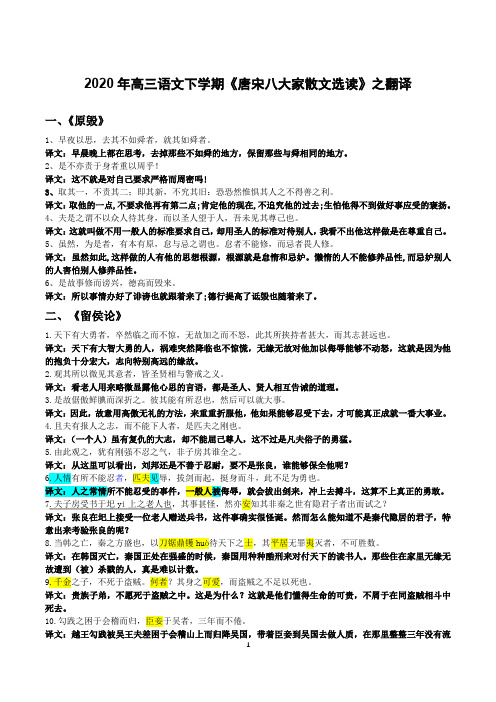
2020年高三语文下学期《唐宋八大家散文选读》之翻译一、《原毁》1、早夜以思,去其不如舜者,就其如舜者。
译文:早晨晚上都在思考,去掉那些不如舜的地方,保留那些与舜相同的地方。
2、是不亦责于身者重以周乎!译文:这不就是对自己要求严格而周密吗!3、取其一,不责其二;即其新,不究其旧:恐恐然惟惧其人之不得善之利。
译文:取他的一点,不要求他再有第二点;肯定他的现在,不追究他的过去;生怕他得不到做好事应受的褒扬。
4、夫是之谓不以众人待其身,而以圣人望于人,吾未见其尊己也。
译文:这就叫做不用一般人的标准要求自己,却用圣人的标准对待别人,我看不出他这样做是在尊重自己。
5、虽然,为是者,有本有原,怠与忌之谓也。
怠者不能修,而忌者畏人修。
译文:虽然如此,这样做的人有他的思想根源,根源就是怠惰和忌妒。
懒惰的人不能修养品性,而忌妒别人的人害怕别人修养品性。
6、是故事修而谤兴,德高而毁来。
译文:所以事情办好了诽谤也就跟着来了;德行提高了诋毁也随着来了。
二、《留侯论》1.天下有大勇者,卒然临之而不惊,无故加之而不怒,此其所挟持者甚大,而其志甚远也。
译文:天下有大智大勇的人,祸难突然降临也不惊慌,无缘无故对他加以侮辱能够不动怒,这就是因为他的抱负十分宏大,志向特别高远的缘故。
2.观其所以微见其意者,皆圣贤相与警戒之义。
译文:看老人用来略微显露他心思的言语,都是圣人、贤人相互告诫的道理。
3.是故倨傲鲜腆而深折之。
彼其能有所忍也,然后可以就大事。
译文:因此,故意用高傲无礼的方法,来重重折服他,他如果能够忍受下去,才可能真正成就一番大事业。
4.且夫有报人之志,而不能下人者,是匹夫之刚也。
译文:(一个人)虽有复仇的大志,却不能屈己尊人,这不过是凡夫俗子的勇猛。
5.由此观之,犹有刚强不忍之气,非子房其谁全之。
译文:从这里可以看出,刘邦还是不善于忍耐,要不是张良,谁能够保全他呢?6.人情有所不能忍者,匹夫见辱,拔剑而起,挺身而斗,此不足为勇也。
散文翻译
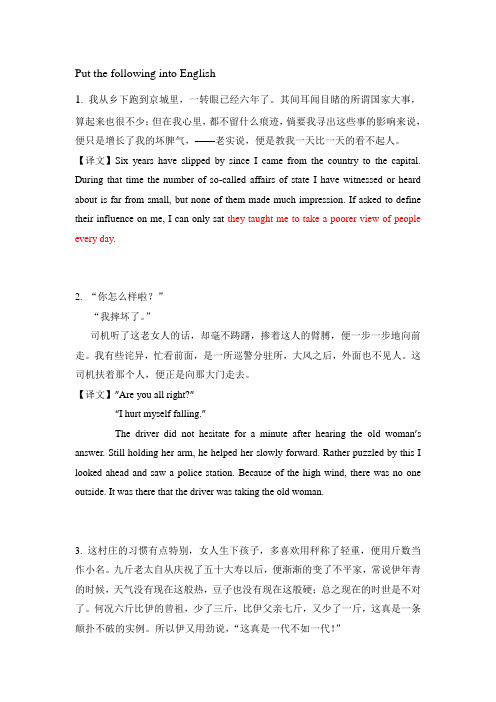
Put the following into English1. 我从乡下跑到京城里,一转眼已经六年了。
其间耳闻目睹的所谓国家大事,算起来也很不少;但在我心里,都不留什么痕迹,倘要我寻出这些事的影响来说,便只是增长了我的坏脾气,——老实说,便是教我一天比一天的看不起人。
【译文】Six years have slipped by since I came from the country to the capital. During that time the number of so-called affairs of state I have witnessed or heard about is far from small, but none of them made much impression. If asked to define their influence on me, I can only sat they taught me to take a poorer view of people every day.2. “你怎么样啦?”“我摔坏了。
”司机听了这老女人的话,却毫不踌躇,掺着这人的臂膊,便一步一步地向前走。
我有些诧异,忙看前面,是一所巡警分驻所,大风之后,外面也不见人。
这司机扶着那个人,便正是向那大门走去。
【译文】”Are you all right?”“I hurt myself falling.”The driver did not hesitate for a minute after hearing the old woman’s answer. Still holding her arm, he helped her slowly forward. Rather puzzled by this I looked ahead and saw a police station. Because of the high wind, there was no one outside. It was there that the driver was taking the old woman.3. 这村庄的习惯有点特别,女人生下孩子,多喜欢用秤称了轻重,便用斤数当作小名。
文学翻译之散文翻译

• Although it is a full moon, shining through a film of clouds, the light is not at its brightest; it is however, just right for me— a profound sleep is indispensable, yet a snatched doze also has a savour of its own (4). The moon light is streaming down through the foliage, casting bushy shadows on the ground from high above,
• (5). Uneven as was the moonlight over the pond, there was a harmony between light and shade, rhythmic as a well-known melody plated on the violin.
• 简析:译文可商榷之处有三:第一,“又像笼着
dark and checked, like an army of ghosts;
• whereas the benign figures of the drooping willows, here and there look like paintings on the lotus leaves (5). The moonlight is not spread evenly over the pond, but rather in a harmonious rhythm and shade, like a famous melody played on a violin (6).
英文散文带翻译youth

英文散文带翻译youthYouth。
Youth is a time of discovery, growth, and change. It is a period in our lives when we are full of energy, curiosity, and ambition. It is a time when we are figuring out who we are, what we want, and how we fit into the world around us.During our youth, we are constantly learning and exploring. We are exposed to new ideas, experiences, and perspectives, which help shape our beliefs and values. We are also developing important life skills, such as communication, problem-solving, and decision-making.One of the defining features of youth is our sense of possibility. We believe that anything is possible and that we can achieve our dreams. This optimism and enthusiasm can be both empowering and daunting. On the one hand, it motivates us to take risks and pursue our passions. On the other hand, it can lead to disappointment and frustrationwhen things don't go as planned.As we navigate through our youth, we face a number of challenges and obstacles. We may struggle with academic or career decisions, relationships, or personal identity. We may also encounter societal pressures, such as expectations around gender, race, or class. These challenges can be difficult to overcome, but they also provide opportunities for growth and resilience.Despite the challenges, youth is a time of great potential and opportunity. It is a time when we can make a positive impact on the world and create a better future for ourselves and those around us. It is a time when we can discover our passions, develop our talents, and build meaningful relationships.As we move through our youth and into adulthood, wewill face new challenges and opportunities. However, the lessons and experiences we gain during our youth will stay with us for the rest of our lives. They will shape who we are and who we become, and help us navigate thecomplexities of the world around us.青春。
英语精美散文带翻译初中
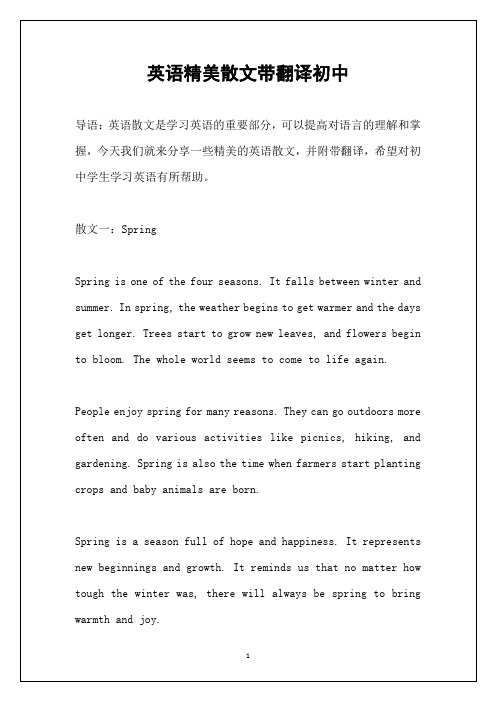
Kindness is a language that the deaf can hear and the blind can see. It has the power to break down barriers and bring people together. Kindness can be as simple as a smile, a kind word, or a thoughtful gesture. It costs nothing, but it can mean everything to someone in need.
True friendship is built on trust, respect, and understanding. It is not about the quantity of time spent together, but the quality of those moments. It’s about sharing laughter, wiping away tears, and being there for each other no matter what.
春天
春天是四季之一,位于冬天和夏天之间。在春天,天气开始变暖,白天变长。树木开始长新叶,鲜花开始盛开。整个世界似乎重新变得生机勃勃。
人们喜欢春天有很多原因。他们可以更频繁地出门,进行野餐、远足和园艺等各种活动。春天也是农民开始种植庄稼和小动物出生的时候。
春天是充满希望和快乐的季节。它代表了新的开始和成长。它提醒我们,无论冬天有多么艰难,春天总会带来温暖和快乐。
在这个有时候不够善待的世界里,选择善待会产生巨大的影响。它能照亮某人的一天,修复一颗受伤的心,甚至改变某人的一生轨迹。因此,让我们共同努力,在我们所到之处传播善待。
现代散文翻译(汉译英)

荷塘月色
沿着荷塘,是一条曲折的小煤屑路。 沿着荷塘,是一条曲折的小煤屑路。这 是一条幽僻的路;白天也少人走, 是一条幽僻的路;白天也少人走,夜晚更 加寂寞。荷塘四面,长着许多树, 加寂寞。荷塘四面,长着许多树,蓊蓊郁 郁的。路的一旁,是些杨柳, 郁的。路的一旁,是些杨柳,和一些不知 道名字的树。没有月光的晚上, 道名字的树。没有月光的晚上,这路上阴 森森的,有些怕人。今晚却很好, 森森的,有些怕人。今晚却很好,虽然月 光也还是淡淡的。 光也还是淡淡的。
荷塘月色
月光如流水一般,静静地泻在这一片叶子和花上。 月光如流水一般,静静地泻在这一片叶子和花上。 薄薄的青雾浮起在荷塘里。 薄薄的青雾浮起在荷塘里。叶子和花仿佛在牛乳 中洗过一样;又像笼着轻纱的梦。虽然是满月, 中洗过一样;又像笼着轻纱的梦。虽然是满月, 天上却有一层淡淡的云,所以不能朗照; 天上却有一层淡淡的云,所以不能朗照;但我以 为这恰是到了好处——酣眠固不可少 酣眠固不可少, 为这恰是到了好处——酣眠固不可少,小睡也别有 风味的。月光是隔了树照过来的,高处丛生的灌 风味的。月光是隔了树照过来的, 落下参差的斑驳的黑影,峭楞楞如鬼一般; 木,落下参差的斑驳的黑影,峭楞楞如鬼一般; 弯弯的杨柳的稀疏的倩影,却又像是画在荷叶上。 弯弯的杨柳的稀疏的倩影,却又像是画在荷叶上。 塘中的月色并不均匀;但光与影有着和谐的旋律, 塘中的月色并不均匀;但光与影 moon sheds her liquid light silently over the leaves and flowers, which, in the floating transparency of a bluish haze from the pond, look as if they had just been bathed in milk, or like a dream wrapped in a gauzy hood. Although it is a full moon, shining through a film of clouds, the light is not at its brightest; it is, however, just right for me - a profound sleep is indispensable, yet a snatched doze also has a savour of its own. The moonlight is streaming down through the foliage, casting bushy shadows on the ground from high above, dark and check ered, like an army of ghosts; whereas the bengin figures of the drooping willows, here and there, look like paintings on the Io tus leaves. The moonlight is not spread evenly over the pond, but rather in a harmonious rhythm of light and shade, like a fa mous melody played on a violin.
散文翻译
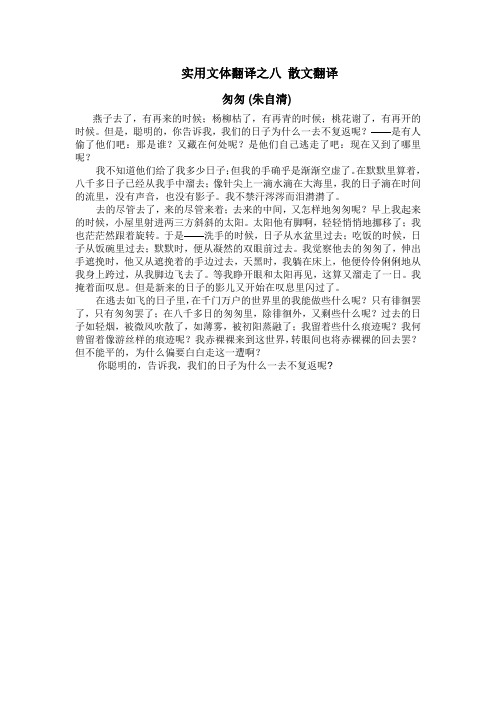
实用文体翻译之八散文翻译匆匆 (朱自清)燕子去了,有再来的时候;杨柳枯了,有再青的时候;桃花谢了,有再开的时候。
但是,聪明的,你告诉我,我们的日子为什么一去不复返呢?——是有人偷了他们吧:那是谁?又藏在何处呢?是他们自己逃走了吧:现在又到了哪里呢?我不知道他们给了我多少日子;但我的手确乎是渐渐空虚了。
在默默里算着,八千多日子已经从我手中溜去;像针尖上一滴水滴在大海里,我的日子滴在时间的流里,没有声音,也没有影子。
我不禁汗涔涔而泪潸潸了。
去的尽管去了,来的尽管来着;去来的中间,又怎样地匆匆呢?早上我起来的时候,小屋里射进两三方斜斜的太阳。
太阳他有脚啊,轻轻悄悄地挪移了;我也茫茫然跟着旋转。
于是——洗手的时候,日子从水盆里过去;吃饭的时候,日子从饭碗里过去;默默时,便从凝然的双眼前过去。
我觉察他去的匆匆了,伸出手遮挽时,他又从遮挽着的手边过去,天黑时,我躺在床上,他便伶伶俐俐地从我身上跨过,从我脚边飞去了。
等我睁开眼和太阳再见,这算又溜走了一日。
我掩着面叹息。
但是新来的日子的影儿又开始在叹息里闪过了。
在逃去如飞的日子里,在千门万户的世界里的我能做些什么呢?只有徘徊罢了,只有匆匆罢了;在八千多日的匆匆里,除徘徊外,又剩些什么呢?过去的日子如轻烟,被微风吹散了,如薄雾,被初阳蒸融了;我留着些什么痕迹呢?我何曾留着像游丝样的痕迹呢?我赤裸裸来到这世界,转眼间也将赤裸裸的回去罢?但不能平的,为什么偏要白白走这一遭啊?你聪明的,告诉我,我们的日子为什么一去不复返呢?参考答案Rush (translated by Zhu Chunshen)Swallows may have gone, but there is a time of return; willow trees may have died back, but there is a time of regreening; peach blossoms may have fallen, but they will bloom again. Now, you the wise, tell me, why should our days leave us, never to return? If they had been stolen by someone, who could it be? Where could he hide them? If they had made the escape themselves, then where could they stay at the moment?I don't know how many days I have been given to spend, but I do feel my hands are getting empty. Taking stock silently, I find that more than eight thousand days have already slid away from me. Like a drop of water from the point of a needle disappearing into the ocean, my days are dripping into the stream of time, soundless, traceless. Already sweat is starting on my forehead, and tears welling up in my eyes.Those that have gone have gone for good, those to come keep coming; yet in between, how swift is the shift, in such a rush? When I get up in the morning, the slanting sun marks its presence in my small room in two or three oblongs. The sun has feet, look, he is treading on, lightly and furtively; and I am caught, blankly, in his revolution. Thus--the day flows away through the sink when I wash my hands, wears off in the bowl when I eat my meal, and passes away before my day-dreaming gaze as reflect in silence. I can feel his haste now, so I reach out my hands to hold him back, but he keeps flowing past my withholding hands. In the evening, as I lie in bed, he strides over my body, glides past my feet, in his agile way. The moment I open my eyes and meet the sun again, one whole day has gone. I bury my face in my hands and heave a sigh. But the new day begins to flash past in the sigh.What can I do, in this bustling world, with my days flying in their escape? Nothing but to hesitate, to rush. What have I been doing in that eight- thousand-day rush, apart from hesitating? Those bygone days have been dispersed as smoke by a light wind, or evaporated as mist by the morning sun. What traces have I left behind me? Have I ever left behind any gossamer traces at all? I have come to the world, stark naked; am I to go back, in a blink, in the same stark nakedness? It is not fair though: why should I have made such a trip for nothing!You the wise, tell me, why should our days leave us, never to return?。
- 1、下载文档前请自行甄别文档内容的完整性,平台不提供额外的编辑、内容补充、找答案等附加服务。
- 2、"仅部分预览"的文档,不可在线预览部分如存在完整性等问题,可反馈申请退款(可完整预览的文档不适用该条件!)。
- 3、如文档侵犯您的权益,请联系客服反馈,我们会尽快为您处理(人工客服工作时间:9:00-18:30)。
大家学习张培基散文选有所帮助。
张培基《英译中国现代散文选》要怎样使用?报考研究生的英专同学都知道,张培基先生的《英译中国现代散文选》在考研圈内很受欢迎,很多同学都把这本书作为必读教材,孜孜矻矻地研究,以求提高翻译的水平。
更有甚者,把书从头到尾背下来,以求考试命中。
虽然这种死记硬背的方法并不值得推介,但死记硬背也并非完全一无是处,一方面天上掉下馅饼,万一砸中也并非不可能;另一方面背书也有好处,多少增加一点语感吧。
但今天要讲的事情和死记硬背没有关系,也不是鼓励大家来背这本书,而是要说一点背道而驰的东西,这本书是不是值得用,要怎么用,为什么?因为老夫一贯不是很主张把《散文选》作为英语专业本科生的参考教材,更不主张把该书的翻译方法在本科教学阶段推广,这一点培训班的同学都知道。
因为该书的译法在很大程度上不是很适合本科生,没有一定的识别能力,没有相当的翻译基础,初入门的学习者拿起该书来学习,难免会出现一些误区,误解,甚至误入歧途。
所以今天就来谈谈《散文选》要怎么用,尤其是对英语专业的本科生来说要怎么用,怎样才能够择其善者而从之,其不善者而去之,扬长避短,争取对考研有最大的帮助。
话说回来,世界上的每一本书都是有优点也是有缺点的,《散文选》也不能够例外,这一点不必讳言。
首先来谈谈《散文选》的优点。
这本书有什么优点呢?有什么地方值得我们学习呢?就老夫看来,首先要学习的是对原文的理解。
理解是翻译的第一步,没有正确的理解,翻译勉为其难。
尤其汉语的理解和英语的理解大相径庭。
一般来说,我们中国人阅读英语时,理解更多是对词汇的理解,对文化的理解,以及字面逻辑关系的理解。
而我们往往受限于词汇的不足,文化的缺失,以及对西文逻辑关系的不适宜,而在理解方面大费周章,难得到位。
但是,另一方面,如果我们词汇认识,文化上没有误读,逻辑关系理清,那么理解就容易很多,翻译也就走好了第一步。
但是,汉语的理解不一样。
中国人在阅读汉语时一般不会有单词不认识,不会有文化缺失,语言逻辑在很多时候也是没有问题的。
但是,另一方面,汉语在逻辑关系上对于语境的依赖远远大于英语对于语境的依赖,也就是说,语境对于汉语的重要性是远远超过英语的。
汉语一个单词的真实意义往往更多地在上下文中寻得,而英语虽然也受语境影响,但语境影响的度远不及汉语。
这就是为什么汉语对语境的依赖性异常重要的原因所在。
那么《散文选》对汉语的理解如何呢?老夫认为是很到位的,理解得很到位,翻译得很到位,很有参考价值。
现举一例,《幼年鲁迅》的第一段第一句:在家里,领着幼年鲁迅的是保姆长妈妈。
她是一个淳朴的农村妇女。
最初大约是一个生活在农村里的年轻的孤孀,死掉了丈夫和丧失了土地之后,就从农村来到城里谋生。
她的姓名,当时是没有人知道的,鲁迅的祖母叫她“阿长”,因此人们也就跟着叫她“阿长”,但孩子们却叫她“长妈妈”。
那么“在家里,领着幼年鲁迅的是保姆长妈妈”要怎么理解呢?尤其是“在家里”要怎么理解呢?是在鲁迅的家里,还是在鲁迅奶奶的家里,还是别的什么人的家里?其实,这里的“在家里”理解为字面上的“在家里”是很不合适的,而是另有意思。
那么又是什么意思呢?《散文选》在翻译时把“在家里”省略去。
确实,这种理解是很到位的。
也就是说这句话只要理解为“很小的时候,照看鲁迅的是长妈妈”就可以,“在家里”不必译出来。
相反,按照字面来理解,“在家里”真的成了“在家里”了,也就是at home之类,那么这句话还说得过去吗。
显然,是说不过去的,为什么呢?我们都知道,民国的时候,或者更早的清末的时候,有钱人家请的保姆并不只是在家里领着孩子,如果主人外出,那么保姆也是要跟着孩子出行的,保姆与孩子是形影不离的,并不只限于在家里。
所以,“在家里”照着字面理解是很有问题的,把其本来意义给缩小了。
英语是一个很较真的语言,如果你翻译成at home,那么别人就会认为,长妈妈只有在家里才带着幼年鲁迅,外出就不一定了。
但实际情况并不是这样,长妈妈与鲁迅应该是形影不离的,这是保姆的职责。
那么,为什么汉语可以说成是“在家里”呢?因为汉语不是一种较真的语言,你可以字面上这么说,但不一定非得照着字面来理解。
汉语的字面意义和深层意义是不一定对等的,或者说有时候对等,但很多情况下不对等。
如果你想知道汉语的真实意义,你就不能够只看她的字面表达,而要看她的深层表达,深层表达才是她的逻辑表达,而这种逻辑表达更多是受上下文语境控制的,语境决定了汉语的真实意义。
为什么汉语的真实意义不一定在字面上呢?而更多受制于语境呢?这是因为汉语缺少逻辑符号,以致意义的表达不是很确定,模糊,很多时候我们都要从宏观的层面,也就是从语境来判断一个单词、短语或者句子到底是什么意思。
如果不能够从宏观层面来判断,只看一个词,一个短语,或者一个句子,我们的判断往往失之于瞎子摸象,得其一隅而失其全貌了。
但英语不一样。
英语是有很多逻辑符号的,每一个单词、短语和句子的意义都比较确定,因为逻辑符号把它们的意义都限定得比较死,不可以有很多弹性。
比方说,“去”这个单词,在任何情况下,“去”在汉语里都只有一种写法,不会有词形的任何变化,但英语里的go 是有很多种词形变化的,goes,going, gone, went。
正是这些词形变化,或者说go打上了逻辑标志,所以就变得很严谨,不容易产生误解,所以就较真,所以就字面意义和深层意义对等。
但汉语从来就不是这样一种较真的语言。
在汉语里,字面所指与真实所指是不一定对等的,真实的意义往往潜藏在语境中,上下文中,要仔细推敲才能够发现。
我们常说的听话听音就是这个道理。
《散文选》把“在家里”省略,符合语境的要求,达到了深层理解的目的,翻译的效果很好。
从《散文选》的整体来看,理解是做得很不错的,值得大家学习,希望大家在看《散文选》时要多看这方面的工作,大力提高自己的理解能力。
其次,我们可以部分地学习《散文选》的措词。
这里之所以说只是部分地学习,是因为《散文选》的措词有时候是不错的,但也有的时候是有问题的。
这就是一个矛盾,我们怎么知道什么时候是不错的,什么时候又是有错的呢?这就要靠自己来判断了,比方说《母亲的回忆》第一句:得到母亲去世的消息,我很悲痛。
我爱我母亲,特别是她勤劳一生,很多事情是值得我永远回忆的。
这句话里的“很多事情是值得我永远回忆的”要怎么翻译呢?《散文选》是这样翻译的:A great many things will forever be cherished in my memory.这里翻译得比较好的是cherish这个单词。
该单词的本义为珍藏,珍视,用在这里很合适,以表达对母亲的尊重和爱戴。
但为什么原文里明明是“值得我永远回忆的”,到译文里就变成了will forever be cherished in mymemory呢?这里有一个转换,把“值得”省略,而加进cherish。
而问题的关键是,这种转换让人并不觉得不适,并不觉得与原文大相径庭,并不觉得离题万里,这就是cherish的巧妙之处。
但另一方面,cherish是怎么想起来的呢?怎么从“值得”联想到的呢?其中有什么思维的张力呢?也许这种思维的张力就是我们所说的语感。
而语感是说不清,道不明的,完全是一种感悟性的东西,或者说是一种语言的功力。
当你的功力达到一定程度之后,你就可以自然而然地想起那些栩栩如生、精彩绝伦的措词来,当然,如果你的功力不足,那么你就怎么想也想不起来。
在措词方面,《散文选》有好的一面,但也有不好的一面,也许在老夫看来好与不好都是那样的醒目,下面以《母亲的回忆》第二段的一个句子来说明。
世代为地主耕种,家境是贫苦的,和我们来往的朋友也都是老老实实的贫苦农民。
这个句子中的“耕种”要怎么理解呢?《散文选》的理解是till land,这句话他是这样翻译的:From generation to generation, they tilled land for landlord only to eke out a bare subsistence. People who associated with them as friends were likewise honest impoverished peasants.till land从字面上来说,应该是耕地的意思。
但文章中的“耕种”是不是和“耕地”是一个意思呢?客观说,耕种的意义比耕地更广,耕地包含在耕种中。
所以,这里的耕种最好翻译为do farm work,“做农活”。
根据上下文以及常识,我们应该知道,农民给地主家做工不一定只是耕地,应该还包括其他农活,比方说播种、收割、晒谷子、入仓等等。
所有这些农活都是农民做的,所以这里的耕种最好理解为做农活,而不要理解为耕地,否则理解的面就太窄了。
当然,这里的措辞不仅仅是一个措词的问题,也是一个理解的问题,措词和理解不是可以完全分开的。
理解和措辞是我们可以从《散文选》译文集里学习的东西,虽然不足依然存在,但总体来说,还是值得学习的地方多,有问题的地方少。
下面来谈谈《散文选》的缺点:首先要指出的是《散文选》在处理句子结构时问题尤多,很多地方都与原文的文气不相符,以致原文的神韵变成译文之后有很多有疑问的地方。
尤其是《散文选》在造句时往往把一些不该断开的句子断开,以致文气打断,阻隔,不畅,这是《散文选》最为不可接受的地方之一。
文气代表着一个句子的风格与特点,与汉语流水句的句式结构息息相关,不能够随便打断。
而一旦打断,往往句子面目全非,风格迥异。
至于《散文选》改变句子的结构和内容,离开原文来做翻译,那更是我们初学翻译的人要极力避开的。
初学翻译的人一般语言能力不是很强,对汉语的把握不是很到位,更遑论英语。
英语也就是半瓶子水,或者连半瓶子水,三分之一,四分之一瓶子水斗没有。
让我们打乱原文的语言结构来重新组织语言,我们有那样的能力吗?而原文的结构一旦被打乱,原文的逻辑关系被改变,那么我们还能够入细入微地把原文的神韵表达出来吗?其实,所谓神韵,即使扣原文也是做起来很费劲的,更不要说不扣原文。
但《散文选》在这方面走得有点过头,它不顾原文的译法在学生中产生了很不好的影响,以致刚入门的新手看到这样的译文,以为翻译就是可以这样不顾原文的,以为翻译就是和写作一样,可以无限度地创造的。
但其实,翻译和写作是两码事。
写作好的人有很好的翻译基础,但不一定能够把翻译做好,如果他不能够遵循一些基本的翻译原则,比方说扣原文,那么翻译十有八九要失败。
下面就举几个例子来分析,首先谈谈断句的问题,还是以《母亲的回忆》为例。
得到母亲去世的消息,我很悲痛。
我爱我母亲,特别是她勤劳一生,很多事情是值得我永远回忆的。
《散文选》是这样翻译的:I was deeply grieved to learn of mother’s death. I love my mother. Of herhardworking life, in particular, a great many things will forever be cherished in my memory.我们细读原文就可以发现,汉语是一步一步地递进的,从“我爱母亲”,到“特别是她勤劳的一生”,到“很多事情是值得我永远回忆的”,对母亲的怀念情感是一步步加深的,中间没有打断。
